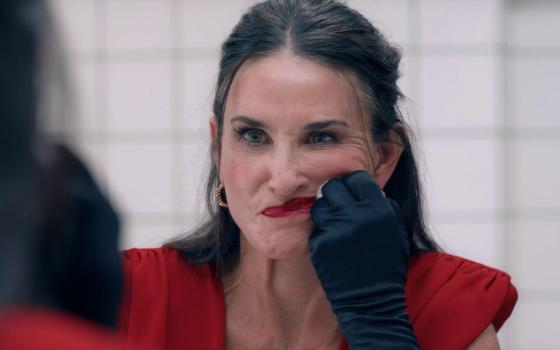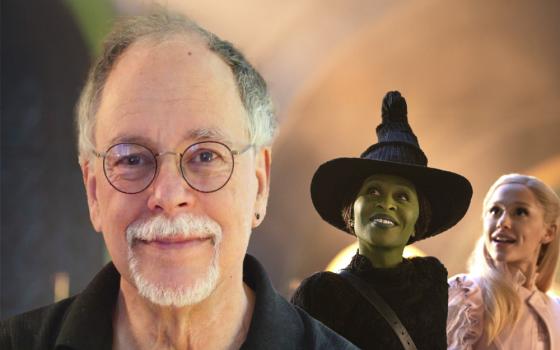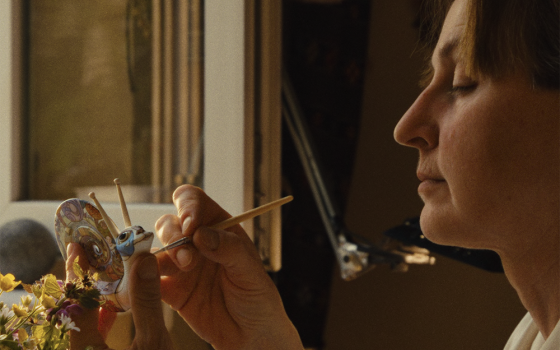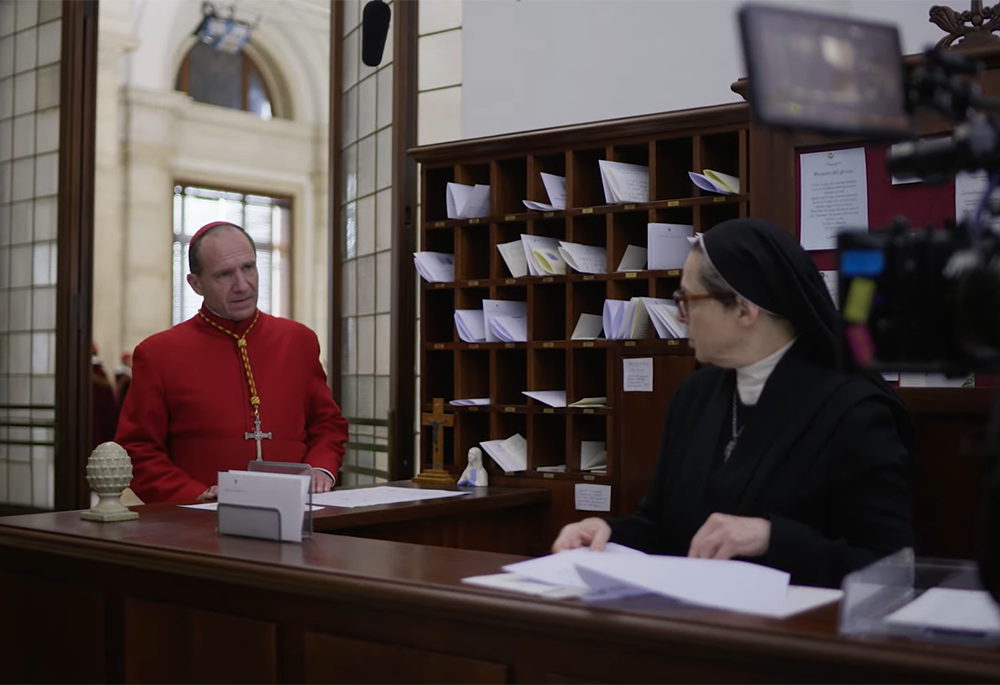
Ralph Fiennes is pictured playing Cardinal Lawrence with Isabella Rossellini as Sister Agnes in a screengrab of behind the scenes footage for director Edward Berger's "Conclave." (NCR/YouTube/Focus Features)
There is a refreshing honesty to director Edward Berger's "Conclave." Its religious characters are complex and multifaceted people who take their faith — and their doubts — seriously.
The National Catholic Reporter spoke with Berger and actors Ralph Fiennes and Isabella Rossellini about accuracy in liturgical portrayals, the role of faith in the creative process, and thoughts about spiritual leadership.
Three separate interviews have been combined, edited and condensed for clarity. This piece contains spoilers.
NCR: One of the first things that stood out to me in this film was that the audience never sees the public or larger Vatican crowd. Yet we feel the pressure of the crowd and its influence on how these men are making their decisions. What went into the decision to keep the film's action constrained to within the Sistine Chapel?
Berger: Shots of the crowd cost money, but the decision was not financially motivated. I wanted to stay in Lawrence's head and his perspective. Lawrence is not with those crowds; mentally he's fully present in the conclave. At the same time, shots of the pope with the crowds for Easter Mass or in St. Peter's Square have permeated our culture. I was much more interested in showing a process that we hadn't seen before.
NCR: There is meticulous attention to detail in this film, from how the characters held their hands in prayer to you wearing the zucchetto. Did anything surprise you in your research of these customs?
Fiennes: If we were to be taken seriously, I knew we had to get the rituals right. If you portray any organization, take the military, for example, there's a way they wear their uniforms and salute. I hate when … it's not done properly or if it's messy. For those who are in these spaces, those elements are important.
One thing that surprised me was the character of Lawrence. He's wonderfully complex and carries a sense of interior contradiction and struggle. He leans towards a more monastic life but he also also struck me as someone who was well-read and who read different interpretations of the Gospels and their teachings. He's not an iconoclastic person, but he does lean towards this view that the church can modernize, which is why I think he is a supporter of Bellini. As an actor, the notion that a priest had a crisis with prayer is very interesting. His crises and doubts make him more real and that much more human.
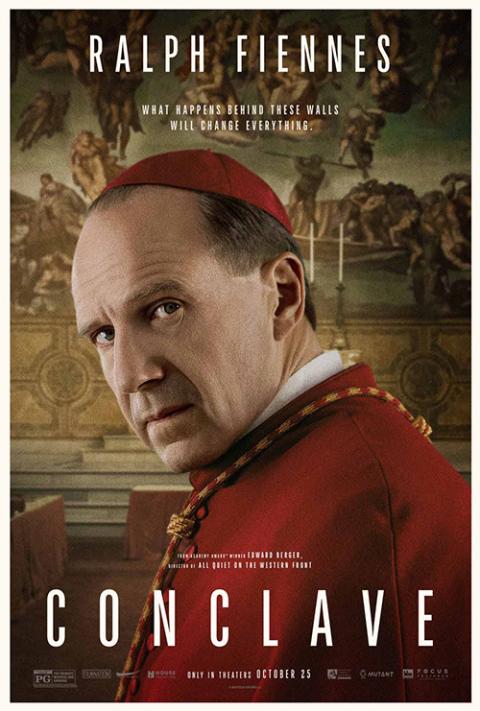
Ralph Fiennes stars in "Conclave." (Focus Features)
Berger: "Conclave" starts with the death of a pope. I remember reading Peter Straughan's script where he had included all those rituals, from the sealing of the pope's quarters to the removal of the ring and all the prayers, and I asked him, "Is everything you're writing about and describing true? Where did you find that?" My curiosity was awakened and I wanted satiation.
NCR: Something that stood out to me upon second viewing was how you and cinematographer Stéphane Fontaine committed to a focus on hands, from the very first shot of a cardinal gripping a suitcase to the way the lens focuses on the hands of those who are praying. What inspired this choice?
Berger: It was more of an intuition … I can't quite describe it. We do so much with our hands. … We pray, we give, we shake hands, we touch … we use it to signal boundaries. By focusing on hands, it felt like we were cutting the body in half in a way and sort of dissecting its role and its importance as a language amid all this ritual.
One of my favorite shots was of Lawrence putting his hand on Adeyemi's [Lucian Msamati]. That gesture of comfort and unity between the two men just felt very human; what was shared between those two in that moment couldn't be expressed through words.
NCR: Lawrence is a tortured character who holds a lot of conflicted interiority. Ralph, how do you approach playing a character where you have few words to communicate such depth of despondency?
Fiennes: You have to have a sense of the character, an inner world that you've marinated on and thought about so that when you come to the set, you've already been living in his headspace. It's a bit hard to talk about the process because so much of it is hunch and intuition.
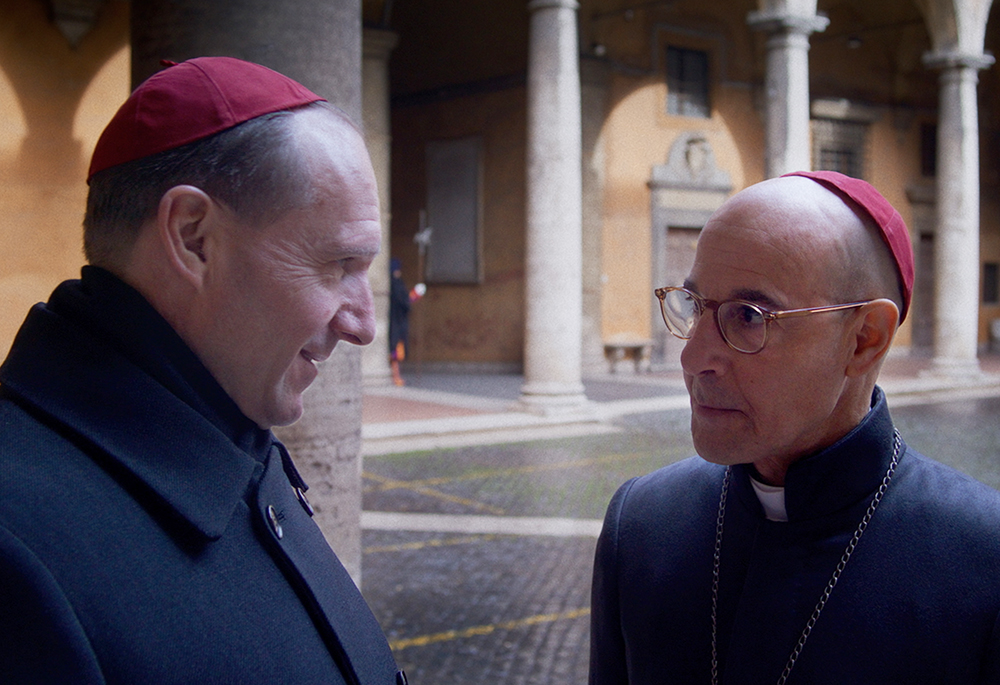
Ralph Fiennes, left, is pictured as Cardinal Lawrence and Stanley Tucci as Cardinal Bellini in director Edward Berger's "Conclave." (Focus Features)
In many ways, I think acting is closer to a sport like tennis. If my opponent — in this case, my director or scene partner — hits the ball to me, how I respond to what they send my way has to be dictated in the moment. I may come up with a strategy or way to play the game but intellectual and cerebral thinking only goes so far. At the end of the day, I have to be open, for example, to how Stanley Tucci [who stars as Cardinal Bellini] is going to play the scene. In the scenes where we're debating and things get heated, I gave a lot of thought to the emotions between us. We both were following our instincts together and that makes each take different too.
'In many ways, I think acting is closer to a sport like tennis. If my opponent — in this case, my director or scene partner — hits the ball to me, how I respond to what they send my way has to be dictated in the moment.'
—Ralph Fiennes
NCR: Isabella, I know you grew up Catholic and went to Catholic school. Could you speak more about what you incorporated from your background into this character?
Rossellini: I was very confident in playing Sister Agnes with great authority. I don't have much dialogue in the film — that was a choice made to emphasize how the Catholic Church is very patriarchal and how men have the decision-making roles. But because I went to a Catholic school, I knew there was more depth than this binary. You could play subservience without having a lack of authority.
My mother was Ingrid Bergman and she always said that acting was a calling for her. She used to say "Acting chose me. I didn't choose acting." When I went to school, I was particularly attached to one of the nuns there. She told me that when she decided to become a nun, her mother was sad because she wanted to be a grandmother. But this nun felt that it was a calling. She gave the same answer as my mom.
I always associated the nuns and my mom with a certain degree of independence and strength. Even though Sister Agnes doesn't have much dialogue, I tried to convey that. She's a character of great authority even in her silence.
NCR: One of my favorite shots in the film draws a parallel between the way the light hits the body of the dead pope and the light of those documents that Sister Agnes scans.
Berger: I like the contrast between the modernity of technology and the archaic nature of humanity. With that shot in particular, I wanted to show how humans often try to use technology to grasp what is unknowable. The scanner may just be scanning through some documents, but in the context of the film, Lawrence is trying to x-ray the human soul and grasp at the ungraspable. We create technology to grasp humanity and to make sense of it so it makes sense that this would manifest in the conclave. But technology has its limits and can't help you with belief; that's where the importance of faith comes in.
Rossellini: I loved Lawrence's speech about doubt. Whether it's society or the church, we forget that we're humans, prone to make mistakes due to our limited understanding. The film reminds you of that. I like that the film ends with a big question mark in many ways. The pope that is selected is not the one people expected, but he is the one who has dedicated his life to the poor and needy.
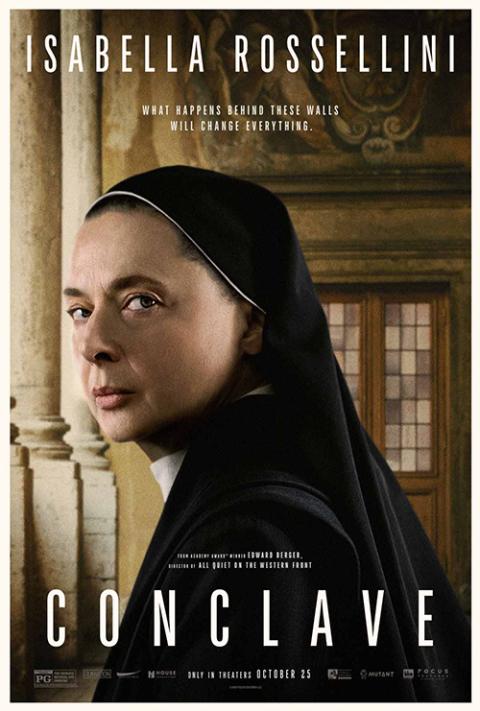
Isabella Rossellini stars in "Conclave." (Focus Features)
I was very moved when Pope Francis was asked a question regarding homosexuality and he said "Who am I to answer? Who am I to judge?" I have a Jewish friend who laughed and said, "Oh if the pope doesn't know it then who would know it?" To me, Francis' response was so touching because it reminds us that we're all human. When leaders embody humility, that's a beautiful thing.
NCR: I think of that humility early in the film when Carlos Diehz's Benitez character blesses the meal and specifically mentions the sisters who prepared the food. There's a sense that he's the first who has done so. The camera cuts to you and you have this great smirk.
Rossellini: As I say later in the film, the sisters are invisible, but not to Benitez. To me, Benitez is the most Christ-like. He's the character who asks, "Have you had lunch?" to Cardinal Lawrence when he's stressed about the logistics of the conclave. He's the one who thanks the nuns for preparing the food instead of just expecting to be able to eat it. Little by little, his worldview disarms and conquers everybody.
I was born in Rome and the life of the Vatican is very present in Roman life. The same debates that are in society are within the church. Within the church there are those same debates between progressives and liberals; people wrestle with personal ambition.
'To me, Francis' response was so touching because it reminds us that we're all human. When leaders embody humility, that's a beautiful thing.'
—Isabella Rossellini, on Francis' response 'Who am I to judge?'
NCR: It's interesting to note too that in that scene, the irony of the nuns being pushed to the side is that the conclave could not run without them.
Rossellini: Absolutely. When you're not in the brawl of fighting for power, you can be above the entrapments and petty conflicts. You can concentrate on the spirituality of the role you've chosen because you're not in the power struggle. You're above what's going on and can remember your calling and the importance of love and grace which the men easily forget since they're trying to win the position.
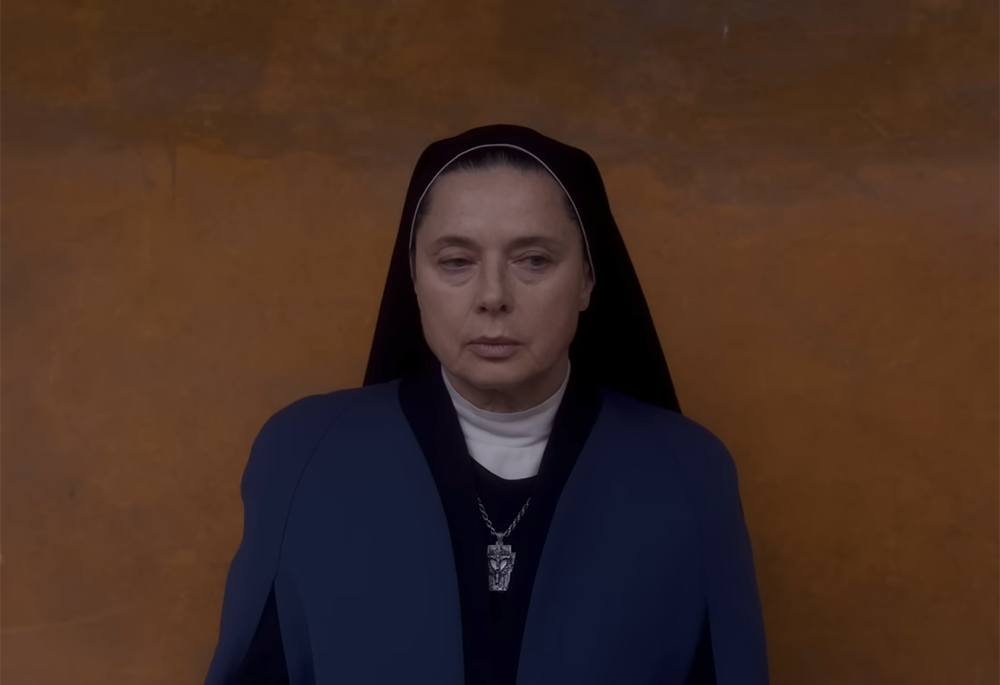
Isabella Rossellini is pictured playing Sister Agnes in "Conclave." (NCR screengrab/YouTube/Focus Features)
NCR: How has working on this film challenged the ways you've thought about spiritual leadership? In a time when people may be questioning the need for institutionalized religion, can spiritual care and leadership be hopeful and restorative?
Berger: This is a big question for spiritual leaders whose job it is to think about these things. I respect their opinions and leadership and I want to be careful to not tread on their ground. That being said, in general, I'm a big believer in non-tribalism. I'm a believer in uniting and listening to people and engaging in discussion even with your worst enemies. We live in such a divisive world, with people so grounded in their certainties that it shuts down conversation. I think it would suit us all well if faith leaders modeled humility to say, "Maybe I'm not always right."
Advertisement
NCR: What role does faith have, if any, in your creative process?
Berger: To me, filmmaking is not a science. My team and I don't have a recipe for making a movie; we have an instinct of how it should be done, but then when you deal with other human beings, the beauty of collaboration is that sometimes the end product will be different than what you thought. You have to react to that and accept those differences as a part of the process.
Whenever I make a decision, I feel like I'm 51% sure and 49% unsure. But I've learned I can't look back. I see faith playing a role there. Even working with actors, like Ralph and Isabella, I can have a vision for how I want something to go but they may do something in the moment that is different from what I think. That's a process of faith where I'm trusting them; that's part of the relationship between the director and actor.
NCR: I'd love to hear about what working with animals was like, particularly the turtles, and what you see the significance of their roles in the story.
Berger: I like the chaos and uncontrollable elements that animals bring to a movie. They uniquely ground movies. We had maybe ten turtles or so. The good thing about them is they don't run away or even if they do, they can't get far (laughs). I remember seeing a fountain full of turtles on the Vatican grounds. They were a gift to the Vatican and when I looked up what turtles mean in different cultures, it turns out they hold a lot of varied significance. As a result, they're great to include in a film because their presence can be open to many different interpretations. In one of those cultures though, a turtle symbolizes transformation and change, in another they symbolized wisdom and age. I thought it would be a nice culmination for Ralph to carry the turtle back to the fountain towards the end of the film keeping those ideas in mind.






